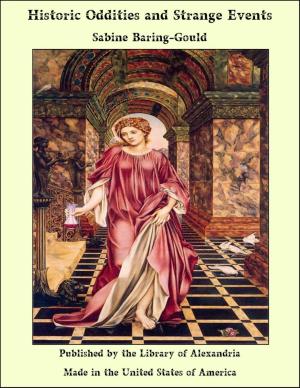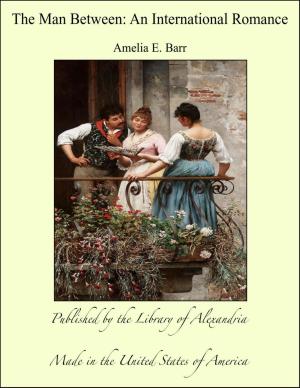| Author: | Francis Marion Crawford | ISBN: | 9781465534767 |
| Publisher: | Library of Alexandria | Publication: | March 8, 2015 |
| Imprint: | Language: | English |
| Author: | Francis Marion Crawford |
| ISBN: | 9781465534767 |
| Publisher: | Library of Alexandria |
| Publication: | March 8, 2015 |
| Imprint: | |
| Language: | English |
The sun was setting on the fifth day of May, in the year of our Lord's grace eleven hundred and forty-five. In the little garden between the outer wall of the manor and the moat of Stoke Regis Manor, a lady slowly walked along the narrow path between high rose bushes trained upon the masonry, and a low flower-bed, divided into many little squares, planted alternately with flowers and sweet herbs on one side, and bordered with budding violets on the Other. From the line where the flowers ended, spiked rushes grew in sharp disorder to the edge of the deep green water in the moat. Beyond the water stretched the close- cropped sward; then came great oak trees, shadowy still in their spring foliage; and then, corn-land and meadow-land, in long, green waves of rising tilth and pasture, as far as a man could see. The sun was setting, and the level rays reddened the lady's golden hair, and fired the softness of her clear blue eyes. She walked with a certain easy undulation, in which there were both strength and grace; and though she could barely have been called young, none would have dared to say that she was past maturity. Features which had been coldly perfect and hard in early youth, and which might grow sharp in old age, were smoothed and rounded in the full fruit-time of life's summer. As the gold deepened in the mellow air, and tinged the lady's hair and eyes, it wrought in her face changes of which she knew nothing. The beauty of a white marble statue suddenly changed to burnished gold might be beauty still, but of different expression and meaning. There is always something devilish in the too great profusion of precious metal—something that suggests greed, spoil, gain, and all that he lives for who strives for wealth; and sometimes, by the mere absence of gold or silver, there is dignity, simplicity, even solemnity. Above the setting sun, tens of thousands of little clouds, as light and fleecy as swan's-down, some dazzling bright, some rosy-coloured, some, far to eastward, already purple, streamed across the pale sky in the mystic figure of a vast wing, as if some great archangel hovered below the horizon, pointing one jewelled pinion to the firmament, the Other down and unseen in his low flight. Just above the feathery oak trees, behind which the sun had dipped, long streamers of red and yellow and more imperial purple shot out to right and left. Above the moat's broad water, the quick dark May-flies chased one another, in dashes of straight lines, through the rosy haze, and as the sinking sun shot a last farewell glance between the oak trees on the knoll, the lady stood still and turned her smooth features to the light. There was curiosity in her look, expectation, and some anxiety, but there was no longing. A month, had passed since Raymond Warde had ridden away with his half- dozen squires and servants to do homage to the Empress Maud. Her court was, indeed, little more than a show, and Stephen ruled in wrongful possession of the land; but here and there a sturdy and honest knight was still to be found, who might, perhaps, be brought to do homage for his lands to King Stephen, but who would have felt that he was a traitor, and no true man, had he not rendered the homage of fealty to the unhappy lady who was his rightful sovereign. And one of these was Raymond Warde, whose great-grandfather had ridden with Robert the Devil to Jerusalem, and had been with him when he died in Nicaea; and his grandsire had been in the thick of the press at Hastings, with William of Normandy, wherefore he had received the lands and lordship of Stoke Regis in Hertfordshire; and his name is on Battle Abbey Roll to this day. During ten years Stephen of Blois had reigned over England with varying fortune, alternately victor and vanquished, now holding his great enemy, Robert of Gloucester, a prisoner and hostage, now himself in the Empress's power, loaded with chains and languishing in the keep of Bristol Castle. Yet of late the tide had turned in his favour; and though Gloucester still kept up the show of warfare for his half- sister's sake,—as indeed he fought for her so long as he had breath,— the worst of the civil war was over; the partisans of the Empress had lost faith in her sovereignty, and her cause was but lingering in the shadow of death. The nobles of England had judged Stephen's character from the hour in which King Henry died, and they knew him to be a brave soldier, a desperate fighter, an indulgent man, and a weak ruler
The sun was setting on the fifth day of May, in the year of our Lord's grace eleven hundred and forty-five. In the little garden between the outer wall of the manor and the moat of Stoke Regis Manor, a lady slowly walked along the narrow path between high rose bushes trained upon the masonry, and a low flower-bed, divided into many little squares, planted alternately with flowers and sweet herbs on one side, and bordered with budding violets on the Other. From the line where the flowers ended, spiked rushes grew in sharp disorder to the edge of the deep green water in the moat. Beyond the water stretched the close- cropped sward; then came great oak trees, shadowy still in their spring foliage; and then, corn-land and meadow-land, in long, green waves of rising tilth and pasture, as far as a man could see. The sun was setting, and the level rays reddened the lady's golden hair, and fired the softness of her clear blue eyes. She walked with a certain easy undulation, in which there were both strength and grace; and though she could barely have been called young, none would have dared to say that she was past maturity. Features which had been coldly perfect and hard in early youth, and which might grow sharp in old age, were smoothed and rounded in the full fruit-time of life's summer. As the gold deepened in the mellow air, and tinged the lady's hair and eyes, it wrought in her face changes of which she knew nothing. The beauty of a white marble statue suddenly changed to burnished gold might be beauty still, but of different expression and meaning. There is always something devilish in the too great profusion of precious metal—something that suggests greed, spoil, gain, and all that he lives for who strives for wealth; and sometimes, by the mere absence of gold or silver, there is dignity, simplicity, even solemnity. Above the setting sun, tens of thousands of little clouds, as light and fleecy as swan's-down, some dazzling bright, some rosy-coloured, some, far to eastward, already purple, streamed across the pale sky in the mystic figure of a vast wing, as if some great archangel hovered below the horizon, pointing one jewelled pinion to the firmament, the Other down and unseen in his low flight. Just above the feathery oak trees, behind which the sun had dipped, long streamers of red and yellow and more imperial purple shot out to right and left. Above the moat's broad water, the quick dark May-flies chased one another, in dashes of straight lines, through the rosy haze, and as the sinking sun shot a last farewell glance between the oak trees on the knoll, the lady stood still and turned her smooth features to the light. There was curiosity in her look, expectation, and some anxiety, but there was no longing. A month, had passed since Raymond Warde had ridden away with his half- dozen squires and servants to do homage to the Empress Maud. Her court was, indeed, little more than a show, and Stephen ruled in wrongful possession of the land; but here and there a sturdy and honest knight was still to be found, who might, perhaps, be brought to do homage for his lands to King Stephen, but who would have felt that he was a traitor, and no true man, had he not rendered the homage of fealty to the unhappy lady who was his rightful sovereign. And one of these was Raymond Warde, whose great-grandfather had ridden with Robert the Devil to Jerusalem, and had been with him when he died in Nicaea; and his grandsire had been in the thick of the press at Hastings, with William of Normandy, wherefore he had received the lands and lordship of Stoke Regis in Hertfordshire; and his name is on Battle Abbey Roll to this day. During ten years Stephen of Blois had reigned over England with varying fortune, alternately victor and vanquished, now holding his great enemy, Robert of Gloucester, a prisoner and hostage, now himself in the Empress's power, loaded with chains and languishing in the keep of Bristol Castle. Yet of late the tide had turned in his favour; and though Gloucester still kept up the show of warfare for his half- sister's sake,—as indeed he fought for her so long as he had breath,— the worst of the civil war was over; the partisans of the Empress had lost faith in her sovereignty, and her cause was but lingering in the shadow of death. The nobles of England had judged Stephen's character from the hour in which King Henry died, and they knew him to be a brave soldier, a desperate fighter, an indulgent man, and a weak ruler















